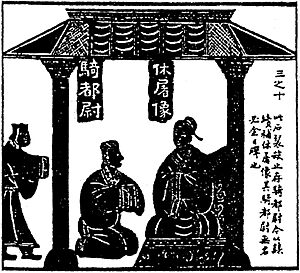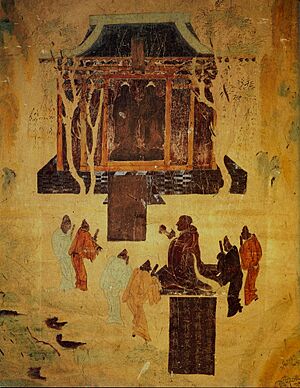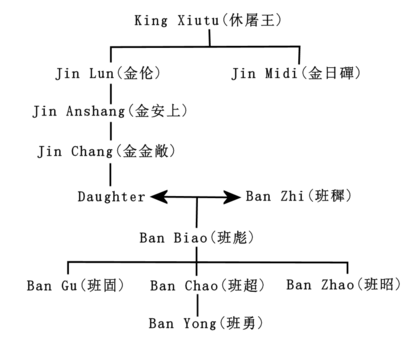Jin Midi facts for kids
Jin Midi (born in 134 BC, died September 29, 86 BC) was a very important person in ancient China. He was a prince from the Xiongnu people, but he became a trusted general and advisor for the Western Han dynasty.
His original family was from the Xiutu Kingdom in central Gansu. He was given the family name "Jin" (meaning "Gold") by Emperor Wu of Han. This was because his family used to worship a special golden statue.
Contents
Jin Midi's Early Life
Jin Midi was born in 134 BC into a royal family of the Xiongnu people. His father was the Prince of Xiutu, a powerful leader under the main Xiongnu ruler, the Gunchen Chanyu.
The Prince of Xiutu and another prince, the Prince of Hunye, were in charge of protecting the Xiongnu's border with the Han dynasty. This area is now central and western Gansu.
A Big Battle and a New Life
In 121 BC, the Han dynasty's general Huo Qubing attacked the Xiongnu. The Han army won a huge victory. They killed many Xiongnu soldiers and captured important people. They also took the golden statues that Jin Midi's father used for worship.
The Xiongnu ruler was very angry. He planned to punish the Prince of Hunye and the Prince of Xiutu. Fearing for their lives, the two princes decided to surrender to the Han dynasty.
However, Jin Midi's father changed his mind at the last minute. The Prince of Hunye then killed him and surrendered to the Han dynasty, taking control of his land. Because his father was killed, Jin Midi, his mother, and his brother became servants for the Han emperor. Jin Midi was sent to work in the imperial stables, taking care of horses.
Serving Emperor Wu
Jin Midi's life changed when he was working in the imperial stables. One day, Emperor Wu wanted to see his horses. Jin Midi and other stable workers brought the horses. Many beautiful women were also there. The other workers stared at the women, but Jin Midi did not.
Emperor Wu noticed Jin Midi's good manners. He was also impressed by how tall and strong Jin Midi was, and how healthy the horses under his care looked. That same day, the emperor gave Jin Midi special robes and made him the director of the imperial stables. From then on, Emperor Wu grew very fond of Jin Midi.
A Special Name and Trust
Emperor Wu remembered that Jin Midi's father had used golden statues to worship. So, he gave Jin Midi the surname "Jin," which means "gold." When Jin Midi's mother passed away, Emperor Wu honored her greatly. He had her picture painted and displayed it in his favorite palace. He called the portrait "The Princess of Xiutu," showing he still respected her royal status.
Jin Midi had two sons who became close to Emperor Wu. One day, one of his sons was misbehaving with the emperor's ladies-in-waiting. Jin Midi saw this and was very angry. He believed his son's actions were wrong, so he killed him. Then, he reported what he had done to Emperor Wu. The emperor was sad about the son's death but was even more impressed by Jin Midi's strong sense of right and wrong.
Protecting the Emperor
In 88 BC, a man named Ma Heluo planned to kill Emperor Wu. Ma Heluo was upset because the emperor had punished his friend's family. Jin Midi stopped this assassination attempt. He saw Ma Heluo about to enter the emperor's room with a knife. Jin Midi quickly grabbed Ma Heluo and held him until other guards could tie him up. This act saved the emperor's life.
Becoming a Regent
In 87 BC, Emperor Wu became very sick. He chose his youngest son, Liu Fuling, to be the next emperor. He called his closest advisors to his bedside to choose a regent. A regent is someone who rules for a child emperor until they are old enough.
Emperor Wu wanted Huo Guang, the younger brother of General Huo Qubing, to be the main regent. Huo Guang first suggested that Jin Midi was more capable. But Jin Midi explained that because he was from the Xiongnu people, others might not respect him as a ruler. So, Emperor Wu made Huo Guang the main regent, and Jin Midi and another official, Shangguan Jie, as secondary regents.
Soon after, Emperor Wu died, and Liu Fuling became Emperor Zhao. Emperor Wu had wanted to make Jin Midi a marquess (a high noble title) for stopping the assassination plot. But Jin Midi politely refused, saying that Emperor Zhao was too young and he shouldn't accept such honors yet.
During Emperor Zhao's Reign

In the fall of 86 BC, Jin Midi became very ill. Huo Guang and Emperor Zhao decided to honor him. They officially made him the Marquess of Du while he was on his sickbed. Jin Midi passed away the very next day. He was buried close to Emperor Wu's tomb. His family continued to serve the Han emperors for many generations, showing their lasting loyalty.
Mausoleum
Jin Midi's tomb is located near the tomb of Huo Qubing and not far from the tomb of Han Wudi in Maoling. You can find its location at 34°20′29″N 108°34′58″E / 34.341407°N 108.582684°E.
Sources
- Book of Han, vol. 68.
- Zizhi Tongjian, vols. 19, 20, 21, 22, 23.
- Han Ji, vols. 13, 15, 16 [1].
 | Sharif Bey |
 | Hale Woodruff |
 | Richmond Barthé |
 | Purvis Young |




